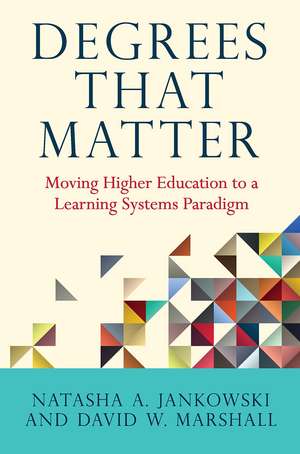Degrees That Matter: Moving Higher Education to a Learning Systems Paradigm
Autor Natasha A. Jankowski, David W. Marshallen Limba Engleză Paperback – 14 aug 2017
| Toate formatele și edițiile | Preț | Express |
|---|---|---|
| Paperback (1) | 315.86 lei 6-8 săpt. | |
| Taylor & Francis – 14 aug 2017 | 315.86 lei 6-8 săpt. | |
| Hardback (1) | 999.79 lei 6-8 săpt. | |
| Taylor & Francis – 17 aug 2017 | 999.79 lei 6-8 săpt. |
Preț: 315.86 lei
Nou
Puncte Express: 474
Preț estimativ în valută:
60.44€ • 65.86$ • 50.93£
60.44€ • 65.86$ • 50.93£
Carte tipărită la comandă
Livrare economică 23 aprilie-07 mai
Preluare comenzi: 021 569.72.76
Specificații
ISBN-13: 9781620364642
ISBN-10: 1620364646
Pagini: 216
Dimensiuni: 152 x 229 mm
Greutate: 0.29 kg
Ediția:1
Editura: Taylor & Francis
Colecția Routledge
Locul publicării:Oxford, United Kingdom
ISBN-10: 1620364646
Pagini: 216
Dimensiuni: 152 x 229 mm
Greutate: 0.29 kg
Ediția:1
Editura: Taylor & Francis
Colecția Routledge
Locul publicării:Oxford, United Kingdom
Public țintă
PostgraduateNotă biografică
Natasha A. Jankowski serves as the Executive Director of the National Institute for Learning Outcomes Assessment (NILOA) and Associate Professor with the department of Education Policy, Organization and Leadership at the University of Illinois Urbana-Champaign. She is co-author, along with her NILOA colleagues, Degrees That Matter: Moving Higher Education to a Learning Systems Paradigm and the book Using Evidence of Student Learning to Improve Higher Education. She loves all things assessment. David W. Marshall
Cuprins
List of Tables and Figures Acknowledgments Introduction1. Landscape of Learning Initiatives 2. Shifting Paradigms 3. Aligning for Learning 4. Applying the Paradigm to Curriculum Mapping 5. Applying the Paradigm to Assignment Design 6. Perceived Barriers in the Learning Systems Paradigms 7. Reframing Academic Quality Appendices References
Recenzii
"This book is an important reminder of the necessity for college and university actors to become aware of the critical role they play in the construction of effective learning environments. The authors advocate for a renewed sense of agency where students, faculty, and administrators do not succumb to a culture of compliance. The authors not only ask for a more active and conscious participation in the construction of learning environments, but also for a more honest and public dialogue about the dynamics that work or do not work in higher education institutions. This book is required reading for educational leaders who want to construct creative, caring, and collaborative forms of learning in higher education institutions."
Teachers College Record
“Amid the clutter of higher education initiatives, Tuning and the Degree Qualifications Profile stand out as complementary and comprehensive pathways toward degrees that matter. This book explains why and how.”
James Grossman, Executive Director, American Historical Association
“Rather than rehashing current debates about the usefulness of higher education, Jankowski and Marshall focus on the heart of the matter, student learning. By rethinking tired conventions, by questioning long held assumptions, and by pointing to the most useful and applicable resources, they offer practical steps for making education more effective and students more successful. Every college or university could stand to benefit from the practical and principled advice this book advances.”
Paul L. Gaston, Trustees Professor, Kent State University
“Drawing on two historic outcomes-based frameworks developed in this century, the Degree Qualifications Profile and Tuning, Jankowski and Marshall describe and illustrate how institutions can now develop their own holistic learning system. Their ‘consensus-based, aligned, learner-centered, and communicated’ system prepares students with relevant twenty-first-century outcomes regardless of when they enter or re-enter our institutions. A must-read for institutional leaders, administrators, faculty, and staff across all institutional types.”
Peggy Maki, Higher Education Consultant specializing in assessing student learning
Teachers College Record
“Amid the clutter of higher education initiatives, Tuning and the Degree Qualifications Profile stand out as complementary and comprehensive pathways toward degrees that matter. This book explains why and how.”
James Grossman, Executive Director, American Historical Association
“Rather than rehashing current debates about the usefulness of higher education, Jankowski and Marshall focus on the heart of the matter, student learning. By rethinking tired conventions, by questioning long held assumptions, and by pointing to the most useful and applicable resources, they offer practical steps for making education more effective and students more successful. Every college or university could stand to benefit from the practical and principled advice this book advances.”
Paul L. Gaston, Trustees Professor, Kent State University
“Drawing on two historic outcomes-based frameworks developed in this century, the Degree Qualifications Profile and Tuning, Jankowski and Marshall describe and illustrate how institutions can now develop their own holistic learning system. Their ‘consensus-based, aligned, learner-centered, and communicated’ system prepares students with relevant twenty-first-century outcomes regardless of when they enter or re-enter our institutions. A must-read for institutional leaders, administrators, faculty, and staff across all institutional types.”
Peggy Maki, Higher Education Consultant specializing in assessing student learning
Descriere
Sponsored by Concerned by ongoing debates about higher education that talk past one another, the authors of this book show how to move beyond these and other obstacles to improve the student learning experience and further successful college outcomes.
